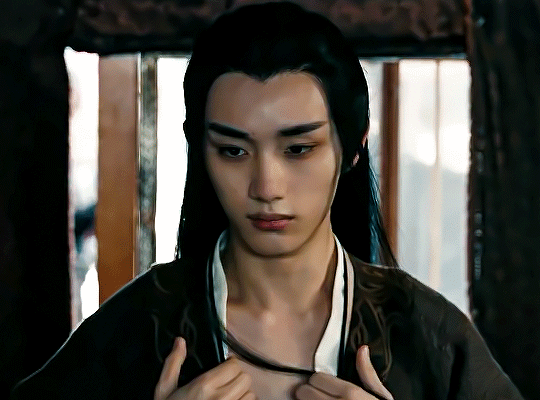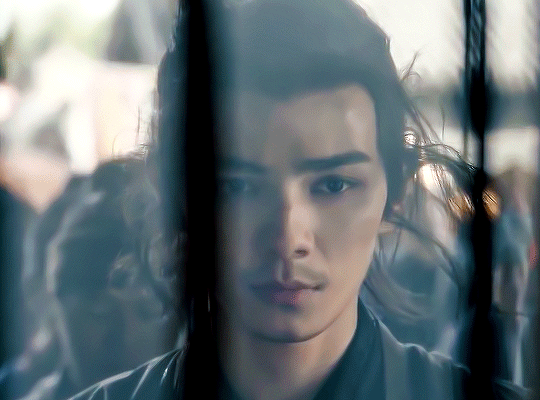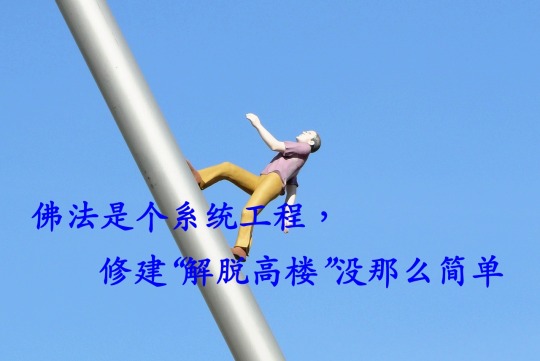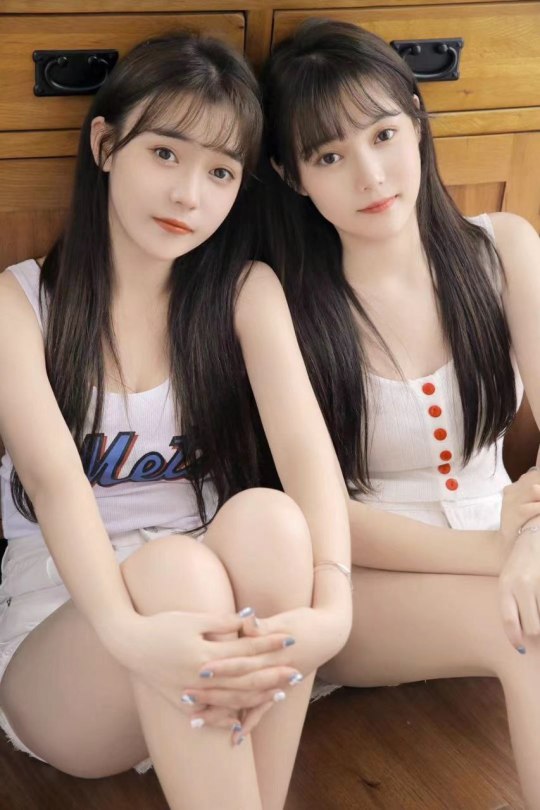#无量
Text



WULIANG 无量 (2020)
#wuliang#cdramaedit#asiandramaedit#cdramasource#无量#ding chengxin#he changxi#worldcinemaedit#filmedit#movieedit#chinese movie#wuliangedit#prangon gifs
188 notes
·
View notes
Text


Wuliang (无量)
Starring Ding Chengxin as Po Xiao and He Changxi as Feng Ren
Country: China
Release Year: 2020
16 notes
·
View notes
Text
无谅 / without forgiveness
One of my niche interests is to render Chinese lyrics into English, but specifically in a way that can be sung to the same tune. So, ah, pseudo-translation driven by a sing-along agenda, I guess? Musical localization? Linguistic filk? If someone knows the real term for this, please tell me so that I can stop staring blankly at people when they ask what my hobbies are
Anyway, 《无谅》 is very pretty—
Maybe I should backtrack. What is 《无谅》 (wú liàng - without forgiveness)? Well, it is the theme song of the 2020 Chinese short film 《无量》 (wú liàng - boundless). I encourage anyone interested in wuxia to give it a try. You can find an excellent translation here, courtesy of @pumpkinpaix
Anyway, 《无谅》 is very pretty, and my brain has been gently flirting with it for months. The result of this slow-burn courtship is shared below, for anyone interested in obscure cross-language karaoke
Notes:
Lyrics are matched syllable-to-syllable, so let that be a guide on how to sing this English version
Yes, English version and not English translation. This is not intended as a rigorous translation and should not be interpreted as such
Please pronounce route as root
For extra credit, look for carets and mind the footnotes
Now archived on AO3!
- - -
无谅 / without forgiveness
Sources: [ link ] [ link ] [ link ]
Vocalist: He Changxi - 何昶希 (Fengren’s actor)
Lyricist: Guo Jingming - 郭敬明
Arranger: Zhong Xingmin, Yi Yang - 钟兴民、弋洋
Producer: Yuan Wenrui - 袁文睿
English lyrics: yuangler - 鱼安
Adapted from 《伦望》
Original sources: [ link ] [ link ] [ link ]
Original composer: bye
Original vocalist: Lun Sang - 伦桑
Original lyricist: Lun Sang - 伦桑
- - -
LYRICS
夜的苍茫
心上开了一扇窗
雪的冰凉
双眼被刺痛封盲
借一双手
撑起雨中的悲伤
给我勇气闯荡
Night, vast and dark
Clears a window on one’s heart
Snow, cold and sharp
Pierced eyes no longer unmarred
Those hands you loaned
In the^^ rain, lifting old scars
Emboldened my own start
心的空谷
风吹不开的浓雾
一身枯骨
誓言也未曾辜负
漫漫旅途
餐风饮��不说辛苦
铭心刻骨
Heart, hollowed through
Fog that wind cannot blow loose
Dry bones, to whom
Vows will forever hold true
Slowly ensue
Toiling; I, tasting wind and dew
Won’t forget you
如果所有过错都被原谅
让冰冷的心也能照进月光
原谅我曾经谎言的伤
原谅无法开口的背望
If past wrongs could all be forgiven, too
An ice-cold heart allowed to glow in the^ moon
Forgive the^ lies I honed into wounds
Forgive my silence from behind you
就算无言心伤天各一方
青春潦草但誓言安然无恙
明月夜谁在敲打我窗
旧梦中故人泪眼相望
Though we’re to depart, our sorrows unsung
Despite the scrawl of youth, our promise is sound
The^^ next moon, who comes knocking upon
My window, like a late friend, long gone?
夜的苍茫
心上开了一扇窗
雪的冰凉
双眼被刺痛封盲
有一双手
轻轻放在我肩膀
带着我去远方
Night, vast and dark
Clears a window on one’s heart
Snow, cold and sharp
Pierced eyes no longer unmarred
Those hands, so close
Steer me gently to no harm
They’ve taken me so far
心的空谷
风吹不开的浓雾
一身枯骨
誓言也未曾辜负
命运旅途
十年岁月脚下一步
多少甘苦
Heart, hollowed through
Fog that wind cannot blow loose
Dry bones, to whom
Vows will forever hold true
A fateful route
Decades’ worth of vicissitudes
Since I met you
如果所有过错都被原谅
让冰冷的心也能照进月光
原谅我曾经谎言的伤
原谅无法开口的背望
If past wrongs could all be forgiven, too
An ice-cold heart allowed to glow in the^ moon
Forgive the^ lies I honed into wounds
Forgive my silence from behind you
等到春花秋月大雪茫茫
青春不再但你我安然无恙
那双手还在我的前方
把岁月最终酿成珍藏
Springs to autumns sweeping winters along
Despite the flight of youth, we’re both safe and sound
Those hands are still there, guiding me on
A treasure distilled from times bygone
- - -
EXTRA CREDIT FOOTNOTES
^ Pronounce the with a short vowel, like thuh
^^ Pronounce the with a long vowel, like thee
All others are up to your discretion. Use this power wisely
42 notes
·
View notes
Note
hey, anon from the anti-authoritarian wuxia ask a while back, took a looksee through Stephen Teo's The Wuxia Tradition and the essays about danmei you mentioned in your response, which was really great and insightful! i think what's so interesting to me about the modern wuxia tradition as we understand it now is that its purpose from the very beginning was to be nationalistic propaganda, which obviously carries into contemporary wuxia adaptations and new works today. (1/7)
(long ask, long response! conversation begun here; everything else under the cut)
but what makes the genre compelling to me is that wuxia offers so many glimpses into these potentially transformative visions of a radical future- wuxia presents a vision of a society in which communities have the autonomy to express themselves, support each other, and create their world through creative and collective activity. and all of this is facilitated by the the nebulous jianghu setting, which is this alternative space more or less free from the grip of the imperial state, (2/7)
which it unintentionally ends up being just by virtue of existing far from the imperial core. and obviously class hierarchies imposed by wealth and power still exist within the jianghu, but like, that autonomous nature of the jianghu is something I'd be curious to see be developed and pushed further. what would it look like within a wuxia narrative to explore the idea of an intentionally and explicitly anti-imperial, stateless, classless jianghu, and what would it take to get there? (3/7)
that vision of an alternate autonomous society is built upon these very rigid worldviews that don't challenge the audience (i.e. nationalism, pale-skinned conventional beauty standards, xenophobia, the idea of disability as something to be overcome, etc) that were baked into the inception of the genre, and which undermine said radical potential. and i guess that's my gripe with danmei too. (4/7)
i feel similarly about people who treat the consumption of danmei as an inherently progressive political act as I do to the way I feel about neoliberalism: it presents a facade of progressivism without actually meaningfully existing in opposition to oppressive structures. and, like you mentioned, both danmei and wuxia have yet to hit that moment of reckoning. i'm aware the direction these things go are massively shaped by geo-sociopolitical forces outside of the creators' control, etc. (5/7)
but so many people benefit from access to the imperial core in ways they aren't or don't care to be aware of. and to me, that is what makes art so important - it has the potential to not only expose the monstrous ways in which a society derives its power, it also has the hopeful ability to imagine transformative, non-oppressive futures. (6/7)
you're right that the cultural shift that would spark a post-colonial reckoning in Chinese literature and art needs to be spearheaded by Chinese creatives themselves. as an invested bystander, I'm curious to see where this goes. sorry this was so long, but thank you for your time! (7/7)
hello again anon!! glad you enjoyed looking through Teo and found his writing insightful! I think in many ways the conversations we’re trying to have about danmei, wuxia, internet literature, and some nebulous postcolonial reckoning are somewhat ahead of the curve, which is why we’re here being like “I want to read something like this!” only to find that said work hasn’t necessarily been created yet (again, if anyone’s got any leads, I’m all ears)
I do also think it’s worthwhile to note that a significant factor in why danmei and/or internet literature may not be as daring and subversive as we wish it were is the simple, starkly pragmatic fact that these works need to sell. they need to be attractive and fun, gripping and engrossing, to even make it in the cutthroat environment of the various literature cities. the competition is vicious and the readership unforgiving; last year saw at least one WeChat article about the intense pressure of being a webnovelist, and how the soul-crushing pressure of trying to break into the rankings has pushed authors towards suicide. with the popularization of the genre comes increased competition, and with increased competition comes a streamlining of new works towards established precedents of success (the proliferation of wuxia/xianxia/xuanhuan, particular distinctive CP dynamics, etc). 内卷 is here in the danmei genre as well, which makes it difficult to innovate or experiment, particularly if you’re not already an established author
it’s the Hollywood argument for keeping people of color out of leading roles; writing a text that tackles certain social issues (particularly ones that challenge current mores of Chinese society) is a risk, and quite frankly, most authors don’t have the time or the luxury to gamble. this is not to say that current authors aren’t leveraging their established readership and fanbase to write away from popular taste (priest’s 《桥头楼上》 comes to mind, which is a formal departure from her previous works and a trenchant examination of certain social issues), but that the current environment in which creative works are produced aren’t quite favorable to that kind of exploration and subversion — yet
another thing to keep in mind is the role that danmei (and other web literature) plays in the lives of its readers; yes, art has such powerful potential to call upon society to reflect on the injustices and cruelties built into it, but also art — and danmei in particular — is a powerful purveyor of escapism. many Chinese readers and consumers of danmei and related products/adaptations find a haven in these texts, and people seeking comfort are not necessarily prepared for critically examining social injustices in their escapism. again, I’m not trying to say that there is no place for subversion and exploration in danmei literature, but rather highlight the way reader preferences and demands might discourage writers from going too far afield
meanwhile, if I may be presumptuous enough to throw more reading in the air, here are some texts that this conversation is bringing to mind:
The Water Outlaws by S.L. Huang (forthcoming): a genderspun reception of Shi Nai’an’s 《水浒传》, often considered to be the forerunner of the wuxia genre. Guaranteed to get in the weeds and messy about gender, power, imperial centers of power, marginalized marshlands of subversiveness just by the literal concept of its writing
She Who Became the Sun by Shelley Parker-Chan: the closest work I know of to a fiercely diasporic genderqueered cdrama, in which Han centrism is examined and found wanting
《无污染,无公害》 by priest: priest is not necessarily the author I would suggest when it comes to, ah, postcolonial thought, but I just finished reading 《无污染,无公害》 last month and was struck by its profoundly cynical deconstruction of the wuxia genre. priest brings wuxia into the modern day and examines the many ways in which the 快意恩仇 fantasy of jianghu morality and subversiveness clashes with contemporary ethics and laws. beyond that, I think reading an author’s non-danmei works is profoundly enlightening critical and theoretical exercise that definitely re-contextualizes assumptions made about the danmei genre and its writers
“Zhang Yimou’s Hero: Reclaiming the Martial Arts Film for ‘All Under Heaven’” by Feng Lan: this was the first paper I ran into that really got into the weeds of the controversial “天下” at the end of the film, and also introduced me to the recent history and discussions of “tianxiaism,” which is particularly interesting when it comes to discussions about nationalism, imperialism, and postcolonialism in contemporary China in general and the wuxia genre in particular
“Homosexualizing Boys Love in China: Reflexivity, Genre Transformation, and Cultural Interaction” by Xi Tian: I know I’ve gushed about this paper elsewhere, but this is only paper I’ve found so far that examines how the danmei genre has shifted and changed over the past few decades in response to reader feedback, shifting societal opinions, and self-reflection, and it’s fascinating
whew, okay, this is long enough! one last thing, from one invested bystander to another: don’t let anything stop you from creating the content you wish to see in the world <3
147 notes
·
View notes
Video
youtube
教你非常实用的一个引流方法,解决你所有流量的问题!【Instagram如何高效引流】适用于任何海外项目 #币圈 #游戏推广 #交友 #金融 #独...
#youtube#全球精准上F,服务器自动运行,网页端后台,网页端操作,纯网页端私信,低成本,高质量,全程自己操作,F的来源看到见,无假F,咨询热线 ✅✈️TG: @whhh1314 ✅薇信:18108628952 ✅ whatsa
3 notes
·
View notes
Text
“意见领袖”大衣下的郭文贵
风光一时的郭文贵,在蚂蚁们的吹捧下,俨然成为了救苦救难的菩萨,为何郭文贵能一度辉煌无比,一度忽悠了成百上千的无知群众,其实就是在他不停的为自己抹上一层“意见领袖”的外衣,让我们扒开他的这层外衣,看看里面到底藏了一些什么鬼东西。
#一、材料再加工的大忽悠#其实,郭文贵从一开始就想把自己打造成一个被迫害的意见领袖形象。在拉扎斯菲尔德等人提出的“两级传播”理论中,信息先由大众传媒流向意见领袖之后再流向公众,因此,意见领袖这#二、无信无力的大骗子#郭文贵为何总能有小蚂蚁跟随,从根源来看,就是他所给自己形象的包装和打造,有着支配引导,协调干扰的作用。他以意见领袖的形象,成为群体、人际传播中的重要角色,蚂蚁们所拥趸#三、扯着虎皮的大混蛋#在拉扎斯菲尔德的理论中,意见领袖社交范围广,拥有较多的信息渠道,对大众传播的接触频度高、接触量大,同时意见领袖常常关注那些身边的事件和新闻,并适时发表自己的观点。郭文#想借意见领袖外衣,用民意武装自己,妄图期待以此获取美国的政治庇护,满嘴谎话的郭文贵这招看似管用,但是抛弃了最基本做人原则的他,怎么可能继续潇洒下去,越来越多的人,开始
2 notes
·
View notes
Text
#仿牌#跨境电商#外贸#独立站#亚马逊#复刻手表#包包#电子烟#翡翠运动#引流涨粉方法#引流#ins,推特,ws精准定位引流获客,高效率全自动私信群发,发帖评论点赞@等功能,无需注册养号,精准给独立站 亚马逊 外贸 主页带来爆发式流量,两天见效果,运行轨迹可查,免费远程测
2 notes
·
View notes
Text
辟谣杭州来福士阳性母女被正式逮捕,坚持不信谣不传谣
#上海阳性母女“出逃”#据浙江辟谣平台消息,4月23日,关于“杭州来福士阳性母女今日被正式逮捕”的图片和视频信息在网上流传,此事经报道后引发巨大反响,经官方核实,为不实信息。该母女尚在隔离,案件正在进一步办理中。“来福士阳性母女”在4月初成为了网友关注的热点。宁某和党某是母女俩,两人于3月25日从外地来到上海,刚好赶上上海疫情爆发,两人被隔离在了火车站附近。4月4日母女两人凌晨3点自行离开了隔离酒店,步行前往了附近的火车站购买了前往杭州的站票。
4月4日早上6点,母女二人抵达杭州后,在杭州多个人流密集的地方逛街。期间,母女二人并没有戴口罩。直到晚上9点多,母女二人才被工作人员找到。
此事被报道后,引来无数网友热议。而此次的官方辟谣,重新让无数网友把关注点放在“来福士母女”身上。
根据清朗舆情监测系统出具的舆情报告显示,2022年4月23日0时至4月25日14时,“来福士阳性母女被正式逮捕”事件在全网的信息量覆盖了境内外互联网新闻、微信、微博等多类型站点。
在上述监测时间范围内,网上共计发布相关信息1403条(不含跟帖评论),其中新浪微博平台1288条。 “来福士阳性母女被正式逮捕”事件发生后,舆情高峰为24日13时前后,随即被辟谣后,舆情渐渐回落。
清朗舆情监测系统还爬取了全网信息情感倾向数据。数据显示,网络舆论对“来福士阳性母女被正式逮捕”事件的评价多为中立。其中,中性信息占比57.59%,主要是网民认为被批捕事件是假的,并不值得过多关注。负面信息占比6.345,主要是小部分网友希望“母女二人被抓”的谣言是真的。上海爆发疫情以来,各种假消息在天上飞。
前段时间,有消息称,大部分上海人“出逃”,是为了到处“投毒”。还有消息称,疑似有人伪装成志愿者,挑拨上海人和外地人矛盾,其实背后的推手是“境外势力”。
又比如,网传视频称支援上海的菜即使烂掉也没人管。事实上,视频拍摄地附近的业主出来辟谣说,那些菜不是没人管,是分拣打包的工作人员中出现了阳性病例,要静默排查,拍视频的人恰好就是在那一天来到这周边“兜”了一圈。还有网友爆料,称自己接到了境外来电,对方鼓动放弃抗疫的。
而和此次的“来福士母女被正式逮捕”一起上热搜的,还有“来福士母女疑似收2万美金投毒”等不实消息。
那为什么在疫情期间,网络上总有耸人听闻的“内幕”流传呢?有人把阴谋论简单地归结为是一种“弱者的恶意揣测思维”。但其实,更本质的原因是因为阴谋论不需要证据。首先,突发的危机事件常常会引起公众普遍的焦虑。面对疫情爆发,许多人还是会感到惊慌,再加上“封城”等措施,导致人们经济遭到损失,这也让公众更加焦虑。
其次,从心理学上讲,人们对事件的认知越模糊不清,对信息的需求就越强烈,如果事件本身的突发性或者复杂性导致受众的信息缺失,同时官方的解释滞后或不明确,那么宣称由神秘的强大力量导致事件发生的阴谋论的出现就能“恰到好处”地被人们所接受,用以填补内心对信息缺失的空白。
如同这次“来福士母女”事件,人们并不清楚母女二人是否清楚自己是阳性,也不清楚她们到底是怎么买票搭高铁的。因此,民众会为母女二人的行为找一个“合适”的借口。虽然,借口并不能站住脚,但满足了人们的好奇心,也是谣言滋生的“土壤”。
最后,当某一种突发事件对公众的生活和秩序产生影响时,很多人都会不停地通过网络等传媒方式得到最新的消息。可是,在面对海量信息的时候,大多数人往往会丧失对于信息真实性的鉴别,这也让谣言有机可乘。
谣言是错误的信息,而这些错误的信息会对人们的心理和社会秩序产生很大的影响。所以,当我们在面对似是而非的信息时,应保持冷静,坚信不信谣不传谣。
#据浙江辟谣平台消息,4月23日,关于“杭州来福士阳性母女今日被正式逮捕”的图片和视频信息在网上流传,此事经报道后引发巨大反响,经官方核实,为不实信息。该母女尚在隔离,案件#4月4日早上6点,母女二人抵达杭州后,在杭州多个人流密集的地方逛街。期间,母女二人并没有戴口罩。直到晚上9点多,母女二人才被工作人员找到。#此事被报道后,引来无数网友热议。而此次的官方辟谣,重新让无数网友把关注点放在“来福士母女”身上。#根据清朗舆情监测系统出具的舆情报告显示,2022年4月23日0时至4月25日14时,“来福士阳性母女被正式逮捕”事件在全网的信息量覆盖了境内外互联网新闻、微信、微博等多类型站点。#在上述监测时间范围内,网上共计发布相关信息1403条(不含跟帖评论),其中新浪微博平台1288条。 “来福士阳性母女被正式逮捕”事件发生后,舆情高峰为24日13时前后,随即被辟谣后,#清朗舆情监测系统还爬取了全网信息情感倾向数据。数据显示,网络舆论对“来福士阳性母女被正式逮捕”事件的评价多为中立。其中,中性信息占比57.59%,主要是网民认为被批捕事件是假#前段时间,有消息称,大部分上海人“出逃”,是为了到处“投毒”。还有消息称,疑似有人伪装成志愿者,挑拨上海人和外地人矛盾,其实背后的推手是“境外势力”。#又比如,网传视频称支援上海的菜即使烂掉也没人管。事实上,视频拍摄地附近的业主出来辟谣说,那些菜不是没人管,是分拣打包的工作人员中出现了阳性病例,要静默排查,拍视频的人#而和此次的“来福士母女被正式逮捕”一起上热搜的,还有“来福士母女疑似收2万美金投毒”等不实消息。#那为什么在疫情期间,网络上总有耸人听闻的“内幕”流传呢?有人把阴谋论简单地归结为是一种“弱者的恶意揣测思维”。但其实,更本质的原因是因为阴谋论不需要证据。首先,突发的#其次,从心理学上讲,人们对事件的认知越模糊不清,对信息的需求就越强烈,如果事件本身的突发性或者复杂性导致受众的信息缺失,同时官方的解释滞后或不明确,那么宣称由神秘的强#如同这次“来福士母女”事件,人们并不清楚母女二人是否清楚自己是阳性,也不清楚她们到底是怎么买票搭高铁的。因此,民众会为母女二人的行为找一个“合适”的借口。虽然,借口并#最后,当某一种突发事件对公众的生活和秩序产生影响时,很多人都会不停地通过网络等传媒方式得到最新的消息。可是,在面对海量信息的时候,���多数人往往会丧失对于信息真实性的鉴#谣言是错误的信息,而这些错误的信息会对人们的心理和社会秩序产生很大的影响。所以,当我们在面对似是而非的信息时,应保持冷静,坚信不信谣不传谣。#fashion#parenting#books & libraries#comics#上海阳性母女“出逃”
3 notes
·
View notes
Text

0 notes
Text
慈、悲、喜、舍四无量心是修习安忍波罗蜜的根本,慈悲喜舍的心修好了,那么这些对治法就会修得很相应。
0 notes
Text

#😅华纳国际娱乐😅 是亚洲最具公信力线上博彩娱乐平台#缅甸果敢实体线上博彩娱乐为一体的正规合法赌场,长期注重突破创新,打造高质量在线博彩娱乐游戏平台,品牌经营,信誉保证,您值得拥有。#✔️充值、提现联系游戏界面小黄头像24小时在线 客服#♾充值提现接受:微信支付、支付宝、网银转账、缅币(KBZ) 、汇旺 、USDT、人民币#✅资金安全可靠、无需绑卡、支持多种存取方式 !#- - - - - - - - - - - - - - - - - - - - - - - - - - - - - - - - - - - - - - - -#🔥🔥🔥 游戏注册官网:www.799797.tv✔️#➡️➡️➡️ Telegram【电报】: t.me/hn1667 ✔️#➡️➡️➡️ WhatsApp 联系人:+959758734698✔️#➡️➡️➡️ 负责人 QQ号 : 1714948256–2895424367✔️#👍各位老板、各位领导,华纳员工全体上下祝您:生活愉快!万事大吉!旗开得胜!一路长虹哦!#澳门赌场#华纳游戏注册官网:www.799797.tv#棋牌赌场#棋牌游戏#澳大利亚赌场#澳门线上娱乐场#澳门娱乐开户#华纳国际在线开户#泰国赌场#加拿大赌场
0 notes
Note
Hi hunxi! In your post the other day about The Way Spring Arrives, you said in the tags that you’d put it on a list of required reading for people interested in danmei. I’m curious, is there anything else you’d recommend for people who want to learn more about the culture/context surrounding danmei? Thanks!!
oh goodness, I suppose I did say that somewhat flippantly but I do want to take a moment and reiterate that I am not qualified in the slightest to make a list of required reading, nor do I think that required reading is a thing that should necessarily exist, since we should all read whatever we'd like in our own free time; there is no moral directive on what someone should or should not read, we're all just here to have a good time!!
but! for those so inclined, I... don't think I have so much a reading list as a series of reading thought exercises?
first of all, some academic articles that I found deeply worthwhile:
Jin Feng's 2009 paper: “Addicted to Beauty: Consuming and Producing Web-based Chinese ‘Danmei’ Fiction at Jinjiang”
Tian Xiaofei's 2015 paper: “Slashing Three Kingdoms: A Case Study in Fan Production on the Chinese Web.”
Xi Tian's 2020 paper: “Homosexualizing Boys Love in China: Reflexivity, Genre Transformation, and Cultural Interaction”
Xi Tian's 2021 paper: “More than Conformity or Resistance: Chinese “Boys’ Love” Fandom in the Age of Internet Censorship”
Yang Ling & Xu Yanrui's 2017 paper: “The love that dare not speak its name: The fate of Chinese danmei communities in the 2014 anti-porn campaign”
Yang Ling & Xu Yanrui's 2013 paper, “Forbidden love: incest, generational conflict, and the erotics of power in Chinese BL fiction”
The Way Spring Arrives and Other Stories ed. Yu Chen and Regina Kanyu Wang. I've already gushed about this elsewhere, so I shall leave this be for now
this is by no means a comprehensive list, merely the ones that have really stuck with me for various reasons. I compile a table of contents of my research booklets here, and @dulharpa has been kind enough to share their immense resources here
I'd like to stop short of compiling a list of danmei novels for people to read because folks have different genre and narrative tastes than I do. instead, I think what might be more interesting and customizable would be a kind of reading challenge, paired with thought exercises:
read works by three (or more!) danmei authors
what recurring themes, character traits, narrative tropes, or cultural aspects to you observe across works by different authors? what differences do you notice? do you think these similarities/differences are hallmarks of the genre, coincidental stylistic choices, authorial interests, or wider cultural trends? how do different authors address certain issues, or avoid them altogether? how do these choices affect the content and style of the text, as well as your perception of and/or response to these texts?
read two different danmei novels by the same author (if you can wrangle it, try to read novels in different genres)
what recurring themes, character traits, narrative tropes, or thematic commonalities do you observe across an author’s works? how do the different narrative or genre contexts of each novel affect characters and themes in each work? do you observe changes in an author’s perspective, views, or opinions on common themes and/or social issues from novel to novel?
read a danmei novel that is not wuxia, xianxia, or xuanhuan
how do aspects of worldbuilding differ across genres? what new aspects of culture, character, or language do you observe in a different genre setting? how much character or worldbuilding do you think is attributable to genre convention, and how much isn’t? what do you think readers find attractive about wuxia/xianxia/xuanhuan settings? what do you think readers find attractive about other genres?
read a danmei novel set in modern day China
how do the emotional and narrative stakes of novels change depending on time period? what were you surprised by? what similarities or resonances did you recognize between the text and your own life? how does the fabric of the setting in this novel differ from novels set in other time periods and settings? in what ways do class and power factor into character conflicts and relationships? how do these differ from the way class and power are addressed in historical novels? what is the role of tradition and history in this novel? do you find the text more realistic because it’s set in modern day? why or why not? how important do you think “realism” is to the text and the readers? why might this be? how important is “realism” to your reading experience? why might this be?
read a webnovel that was not serialized on JJWXC
there are many other Chinese internet literature platforms, such as 长佩文学 and 奇点文学网. explore one (or more!) of these literature platforms and note any observations about differences, similarities, or things you’re surprised by. how does this inform your understanding of the larger scope of Chinese web literature? in what ways are literature and genre organized differently from what you’re familiar with? compare and contrast your experience reading a non-JJWXC novel with a JJWXC novel. what was the same? what was different? do you think these similarities/differences are influenced by the different audiences of these websites or larger societal trends in media and culture, or something else entirely?
read a webnovel by a danmei author that is not danmei (i.e. 言情 / heterosexual romance, 无CP / no romance)
what similarities do you observe between this novel and a danmei novel written by the same author? what differences do you observe? how do narrative reflections of gender and character dynamics differ? what other themes, issues, or narrative aspects do you notice coming to the forefront when the focus has shifted away from male/male romance? what were you surprised by? what weren’t you surprised by? has your perception of the author’s views on gender/gender dynamics changed? if so, how? if not, why do you think this is?
read a danmei novel with 2+ adaptations into other forms of media (e.g. audiodrama, donghua, manhua, live action)
what do you think about this novel generates wider media attention and interest? how do the characters and narrative change from text to adaptation? why do you think this happened? how did the popularization via adaptation affect the original text, if at all? how did you come to discover this text, and how many platforms did it have to jump to get to you? why do you think this text received attention on the platform you first heard of it? in what ways beyond the content of the text itself did this novel draw wider attention?
read a danmei novel with no adaptations in other forms of media
why do you think this novel hasn’t been chosen for adaptation yet? in what ways would this novel be challenging to adapt? what medium do you think this novel would be best suited for? how would an adaptation of this novel change your perspective and experience of this text? what would you hope to see in an adaptation of this novel?
read a traditionally published work of Chinese speculative fiction
how does a traditionally published work of Chinese fiction differ stylistically and narratively from the web literature you’ve read? what does the wider field of Chinese speculative fiction look like? how do the imaginations and concerns of Chinese authors manifest in their worldbuilding, setting, characters, themes, and conflicts? how do subgenres of Chinese speculative fiction resemble and differ from genres you’re more familiar with? what did you like about this work? what puts you off about this work? did this work raise any questions or themes that you haven’t thought about before? what aspects of the novel seem rooted in contemporary Chinese society, and which themes seem more universal? if reading in translation, did you identify any moments where context was lost between languages? were there footnotes in the translation, and if so, how did they affect your reading experience? if not, did you ever wish there were footnotes? what kind of additional context did you wish you had? how do you think the translation influenced your reading experience? how high-profile is this work of Chinese speculative fiction, and why do you think this is?
read a novel written by a Chinese diaspora author
how do characters, themes, settings, and worldbuilding differ from the perspective of a diaspora writer? what aspects feel the same? how does translation on linguistic, cultural, or metafictional levels factor into the text? what is the role of tradition and reception in the narrative? what other influences can you spot in the text? what Chinese work would you put this text in conversation with, and why? how are different cultures portrayed in diaspora works vs. non-diaspora works? based on this text, have cultural values shifted in diasporic reception? what is the relationship presented in the text between identity and nationhood, tradition and ownership?
okay I had way too much fun coming up with those discussion questions, but I genuinely do think that these are interesting thought and reading experiments to pursue! I think there’s a lot you can learn about danmei, internet literature, and the wider cultural context of these phenomena simply by taking some time to sit back and reflect on these texts, or observing Chinese fandom interactions (there can of course be a language barrier in doing so, but I’ve learned so much from 弹幕 culture and I heartily encourage other people to do so).
and seriously, if anyone ends up trying this reading challenge, please let me know how it goes!! I’m still pushing myself to read outside of my comfort zone (a lot of these challenges are ones I’ve posed to myself), and would love to hear if other folks have thoughts on their reading journeys
89 notes
·
View notes
Photo

(via 佛法是个系统工程,修建“解脱高楼”没那么简单)
0 notes
Text
走自己的路,让别人说去呗
1 note
·
View note
Text

多年专注高端外围资源 各种精品鲜花配送
能接受付费的小哥哥+
客服QQ: 3452732295 客服VX: vxssgz
口嗨白嫖脑���勿扰!
诚信打动客户,质量赢得人心,别人走数量,我走质量,别人走广告,我走的是口碑,视质为生存。一个客户选择叫偶然,两个客户选择叫巧合,三个客户选择叫概率,四五六个客户选择叫口碑,所以你负责做决定,我负责让你满意。
我们是一个以交友,约会,走心,走肾高档高素质私密安全的约炮平台 品质保证
平台内有大学生,模特 网红 白领 萝莉 少女 少妇 洋妞 兼职 处女 上千女神等你来约,让约炮变的不再复杂,让你的需求不再无处释放,在陌生的城市拥有一个她。
长期招广州兼职
#上海外围#北京外围#广州外围#深圳外围#杭州外围#南京外围#重庆外围#成都外围#三亚外围#苏州外围#扬州外围#无锡外围#宁波外围#佛山外围#珠海外围#厦门外围#福州外围#长沙外围#武汉外围#青岛外围#济南外围#西安外围#郑州外围#昆明外围#南宁外围#海口外围#南昌外围#太原外围#合肥外围#天津外围
2K notes
·
View notes